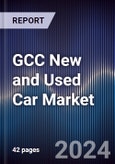The GCC New and Used Car Market is experiencing notable growth, establishing itself as a key hub for various types of cars. Predicted to grow at a substantial rate of 6.4% from 2023 to 2028, the market is driven by factors such as a rising population, an influx of expatriates, increased income levels, and the availability of financing options. The growing population and expatriate community contribute to a larger customer base, while higher incomes enable consumers to consider a broader range of vehicles, driving market expansion.The GCC New and Used Car Market is experiencing notable growth, establishing itself as a key hub for various types of cars
Easy access to financing options further stimulates demand for both new and used cars. Additionally, the market's future trajectory is influenced by technological advancements, government incentives, infrastructure development, changing consumer preferences toward sustainability, and alignment with global economic trends. Together, these factors indicate a positive outlook for the GCC New and Used Car Market, highlighting sustained growth and the region's significant role in the automotive industry.
In the GCC New and Used Car Industry, top players form a diverse ecosystem. Notable clusters like Al Quoz and Al Aweer in Dubai focus on used car sales, while Dubai Auto Zone streamlines business setup. Souq Al Haraj specializes in used car sales, Motor World in Abu Dhabi emphasizes economy cars, and Ajman Auto Market is a key player. Competitiveness revolves around pricing, customer service, vehicle quality, market reputation, and technology. The future outlook is promising, driven by population growth, rising incomes, financing ease, and industry trends, positioning the GCC as a significant player in the automotive sector.
GCC New and Used Car Market Analysis
Initially, the GCC New and Used Car Market relied on physical showroom visits and had longer purchase processes.Later, during the Change Stage (2016-2021), online viewing of car specifications reduced the need for physical showroom visits. Showrooms shifted focus to test drives and paperwork.
Dealers adapted to new technologies, training their staff and emphasizing online platforms. Notably, there was a rise in the sales of 27,495 hybrid and 22,382 electric vehicles from 2020 to 2022.
Currently, in the Modern Market Stage (>2022), there's a focus on governance, environmental responsibility, and societal values.
Manufacturers are expected to prioritize eco-friendly vehicles, using technology to enhance environmental responsibility.
The market strongly emphasizes eco-friendly vehicles, aligning with governance and societal values.
Key market drivers include government regulations, consumer awareness, infrastructure development for electric vehicles, technological innovations, economic factors, and alignment with global trends, such as the shift towards electric and hybrid vehicles.
Key Trends by Market Segment
By New Car Sales: In 2023, the GCC New and Used Car Market sees significant segmentation in the new car sales segment, with Saudi Arabia leading by over 50%, followed closely by the UAE. Smaller contributions from Kuwait, Qatar, and Oman also play a role. Saudi Arabia's dominance is attributed to its strong economy, population growth, supportive government initiatives, ongoing infrastructure development, evolving consumer preferences, and alignment with global automotive trends. These factors collectively drive robust demand for new cars in the region, highlighting Saudi Arabia as a key influencer in shaping the market dynamics.By Used Car Transactions: In 2023, the GCC New and Used Car Market's segmentation by used car transactions highlights Saudi Arabia as the predominant player, holding a substantial share of around 50%. The UAE follows closely, with smaller contributions from Kuwait, Qatar, and Oman. Saudi Arabia's dominance is influenced by its strong economy, population growth, preferences for resale markets, supportive government regulations, increasing market awareness, and growing infrastructure. These factors collectively drive a thriving market for used cars, positioning Saudi Arabia as a key influencer in shaping the used car dynamics in the region.
Competitive Landscape
Major Players in GCC New and Used Car Market
Al Quoz cluster in Dubai, known for used cars, achieved 14,000 sales across 40 showrooms.Al Aweer cluster in Ras Al Khor is a central marketplace for pre-owned vehicles, particularly focused on used car trade.
Dubai Auto Zone attracts companies with streamlined setup procedures and regulatory support.
Souq Al Haraj cluster exclusively deals in used car sales, averaging 277 cars per showroom annually.
Motor World in Abu Dhabi operates ~400 showrooms, with a significant focus on trading economy cars.
Ajman Auto Market holds a prominent position in the used car trading ecosystem in the UAE.
Market drivers include strategic geographical locations, regulatory support, market specialization, economic dynamics, and established market reputation, collectively shaping the competitive landscape in the GCC New and Used Car Market.
Future Outlook
The GCC is emerging as a prominent automotive hub for various car types, poised to grow at a CAGR of 6.4% from 2023 to 2028.Key growth drivers include a growing population, influx of expatriates, rising income levels, and easy financing options.
Rising incomes enable consumers to consider a broader range of vehicles, contributing to market expansion.
Accessible financing options make it convenient for consumers to purchase both new and used cars, stimulating demand.
Other future market drivers include technological advancements, government incentives, infrastructure development, shifting consumer preferences towards sustainable vehicles, and alignment with global economic trends.
The overall outlook suggests a promising future for the GCC New and Used Car Market, with sustained growth expected in the coming years.
Additional benefits of purchasing an enterprise license:
- TAM/SAM/SOM Analysis
- Customer Cohort Analysis
- Marketing Initiatives
- White Space Opportunity Analysis
- Interactive Data Visualizations
- Customization: 20 Analyst Hours
- 3 Months Post Sales Analyst Support
- Complimentary Update Next Year
- Custom Webinars
Table of Contents
Companies Mentioned (Partial List)
A selection of companies mentioned in this report includes, but is not limited to:
- NXT Used Cars
- Andaleeb Cars
- GTA Cars
- Gargash Mercedes-Benz
- AWR Nissan
- Car Point
- World Auto Corporation
- Dune Motors
- Al Ihsan Used Cars
- Al Faris Used Cars
- First Choice Cars








